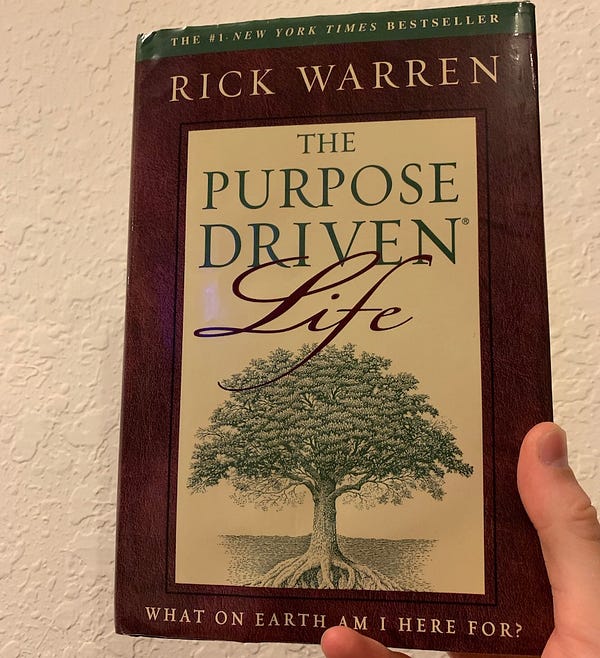The Purpose Driven Life: What on Earth Am I Here For? by Rick Warren

I have worked my way through some pretty impactful books in the past few years. This one may just trump them all. Not only was it something that became a daily discipline over the 30 days that it led each reader through but it was also something that focused and directed me in the way that I carried out my days during that time and also in the way that I live my life now.
What on Earth Am I Here For? (section 1)
The first note I highlighted for myself was all about what fear does within our lives. The last part hit me hard, “nothing can compensate for not knowing God’s purposes for your life.” Wow. But it’s total fact. There is nothing that compensates for that. If there was, why would we need God?
Pg. 29, Fear is a self-imposed prison that will keep you from becoming what God intends for you to be. You must move against it with the weapons of faith and love. Nothing matters more than knowing God’s purposes for your life, and nothing can compensate for not knowing them.
Yes yes and yes again. Life can be many things. For one person maybe a burden, for another maybe an opportunity, for yet another maybe a blessing, and for another person maybe a struggle. Your life might be all of those things at one time or another but God shows us life is a blessing every morning — simply by waking us up.
Pg. 41, Seeing Life from God’s View.
“We don’t see things as they are, we see them as we are.” — Anaïs Nin
How you define life determines your destiny. Your perspective will influence how you invest your time, spend your money, use your talents, and value your relationships. One of the best ways to understand other people is to ask them, “How do you see your life?”
Which one do you struggle with the most? For me, it’s the trust part of it. In the past, I’ve really made my own decisions and everything has worked out pretty well for me. As a result, it’s hard for me to place reliance on something I can’t control — and when we trust God’s direction for our life, it will be quite different from what we would anticipate.

Pg. 42, The Bible offers three metaphors that teach us God’s view of life: Life is a test, life is a trust, and life is a temporary assignment. These ideas are the foundation of purpose-driven living.
Eternal implications. Do we think about that enough? Probably not, but we should. Every interaction matters. No matter who sees it or who doesn’t see it, every interaction matters. God is always watching us and is always with us. That doesn’t mean there’s a lot of pressure, our God is a God of mercy and a God of grace. What it does mean is that we can always lean on and rely on God. As the author shared a page before, we should trust God, overcome all tests with Him, and focus on the end goal — heaven.
Pg. 43, Character is both developed and revealed by tests, and all of life is a test. You are always being tested. God constantly watches your response to people, problems, success, conflict, illness, disappointment, and even the weather! He even watches the simplest actions such as when you open a door for others, when you pick up a piece of trash, or when you’re polite toward a clerk or waitress.
I have noticed that God tests my faith through problems, tests my hope by how I handle possessions, and tests my love through people.
When you understand that life is a test, you realize that nothing is insignificant in your life. Every day is an important day, and every second is a growth opportunity to deepen your character, to demonstrate love, or to depend on God. Some tests seem overwhelming, while others you don’t even notice. But all of them have eternal implications.
John Maxwell shared a great message about stewardship at Christ Fellowship in the past and Rick Warren shared much the same perspective here. God entrusted us with this world and asked Adam and Eve to take care of it. Now, it’s up to all of us to be good stewards of what God has created and has given.
Pg. 45, Our culture says, “If you don’t own it, you won’t take care of it.” But Christians live by a higher standard: “Because God owns it, I must take the best care of it that I can.”
The more God gives you, the more responsible he expects you to be.
This is our goal. It’s what we were created for, God asks for good stewardship of everything we have. Along with that, I remember the parable of the three servants. One servant could not even be trusted with one coin, the other two were both rewarded and congratulated equally.
Pg. 45, If you treat everything as a trust, God promises three rewards in eternity. First, you will be given God’s affirmation: He will say, “God job! Well done!” Next, you will receive a promotion and be given greater responsibility in eternity: “I will put you in charge of many things.” Then you will be honored with a celebration: “Come and share your Master’s happiness.”

I love this, I NEED this constant reminder. There are many things that are outside of my control in this life and sometimes I feel as though it’s hopeless and I’ll never be happy. Then I remember this and remember that life here is temporary and God has true happiness in heaven.
Pg 50, In order to keep us from becoming too attached to earth, God allows us to feel a significant amount of discontent and dissatisfaction in life — longings that will never be fulfilled on this side of eternity. We’re not completely happy here because we’re not supposed to be! Earth is not our final home; we were created for something much better.
Amen Amen Amen. That means working with all of our ability in the name of God. That means loving others with all of our ability in the name of God. That means dreaming big in the name of God. That means praying faithfully in the name of God.
Pg. 54, Living for God’s glory is the greatest achievement we can accomplish with our lives.
Purpose #1 You Were Planned for God’s Pleasure
I love the story of Noah and the amazing task that God called him to yet I wasn’t too familiar with all the doubt that he had. I admire the way God worked in Noah’s life. Faith, pure faith can create so many things that are beyond our greatest imagination.
Pg. 71, There were three problems that could have caused Noah to doubt.
First, Noah had never seen rain, because prior to the Flood, God irrigated the earth from the ground up.
Second, Noah lived hundreds of miles from the nearest ocean. Even if he could learn to build a ship, how would he get it to water?
Third, there was the problem of rounding up all the animals and then caring for them. But Noah didn’t complain or make excuses. He trusted God completely and that made God smile.
Trusting God completely means having faith that he knows what is best for your life. You expect him to keep his promises, help you with problems, and do the impossible when necessary.
Amen. This is THE way to live.
Pg. 76, When you live in light of eternity, your focus changes from “How much pleasure am I getting out of life?” to “How much pleasure is God getting out of my life?”
Everything we have belongs to God, we need to live like that.
“Do you understand that it’s impossible to please God in any way other than wholehearted surrender?” — Francis Chan
Pg. 78, God wants your life — all of it. Ninety-five percent is not enough. There are three barriers that block our total surrender to God: fear, pride, and confusion. We don’t realize how much God loves us, we want to control our own lives, and we misunderstand the meaning of surrender.

Again, God wants all of us. And worshiping even when we do not feel like it empowers us to worship Him at a deeper level in the future. Our lives are meant to glorify God, each and every day should be worship simply by the way that we live.
Pg. 106, When you praise God even when you don’t feel like it, when you get out of bed to worship when you’re tired, or when you help others when you are worn out, you are offering a sacrifice to God. That pleases God.
And this is so so so so true. I just decided right now on November 1, 2019 that I’m going to expand on this thought and write a whole piece on it.
Pg. 110, The most common mistake Christians make in worship today is seeking an experience rather than seeking God. He wants you to sense His presence, but He’s more concerned that you trust Him than that you feel Him. Faith, not feelings, pleases God.
Purpose #2 You Were Formed for God’s Family
Everything that God designed He did so with a great purpose. And often, that purpose is incomprehensible by us — humans. But everything in the Bible that is designed by God was done so for a reason and I’m learning that more and more each and every day.
Pg. 136, God designed His church specifically to help you fulfill the five purposes He has for your life. He created the church to meet your five deepest needs: a purpose to live for, people to live with, principles to live by, a profession to live out, and power to live on.
It includes unselfish loving, honest sharing, practical serving, sacrificial giving, sympathetic comforting, and all the other “one another” commands in the New Testament. Yes, yes, and yes yes yes. I could not emphasize this more than I already do. This is living. As the old adage goes, “Your life may be the only Bible that someone reads.” Will people KNOW you’re a Christian by your actions? NOT think but truly know.
Pg. 138, Real fellowship is so much more than just showing up at services. It is experiencing life together. It includes unselfish loving, honest sharing, practical serving, sacrificial giving, sympathetic comforting, and all the other “one another” commands in the New Testament.
We can forgive someone and never trust them again. As the parable of the 3 servants goes, those who can be trusted with little will be trusted with much.
“Resentment is like drinking poison and then hoping it will kill your enemies.” — Nelson Mandela
Pg. 142, Remember, you will never be asked to forgive someone else more than God has already forgiven you. Whenever you are hurt by someone, you have a choice to make: Will I use my energy and emotions for retaliation or for resolution? You can’t do both. Many people are reluctant to show mercy because they don’t understand the difference between trust and forgiveness. Forgiveness is letting go of the past. Trust has to do with future behavior.
Candor.
That doesn’t mean we speak without thinking, it means that we share what is necessary and true and about the other person. Candor is defined as, “the quality of being open and honest in expression; frankness.”
Pg. 146, Often we know what needs to be said to someone, but our fears prevent us from saying anything. Many fellowships have been sabotaged by fear: No one had the courage to speak up in the group while a member’s life fell apart.
The Bible tells us to “speak the truth in love” (Ephesians 4:15) because we can’t have community without Candor.

I want to be surrounded by people who will do these things for me and with me and allow me to do them for them and with them. There are not many people that I can think of that could do all of these on a regular basis. It’s time to get serious about my Christian family and I really aspire to join a small group in 2019. I have a Bible study group already but no one that I connect with as deeply as I would like to connect with someone.
Pg. 151, If you are a member of a small group or class, I urge you to make a group covenant that includes the nine characteristics of biblical fellowship: We will share our true feelings (authenticity), encourage each other (mutuality), support each other (sympathy), forgive each other (mercy), speak the truth in love (honesty), admit our weaknesses (humility), respect our differences (courtesy), not gossip (confidentiality), and make group a priority (frequency).
When you look at the list of characteristics, it is obvious why genuine fellowship is so rare. It means giving up your self-centeredness and independence in order to become interdependent. But the benefits of sharing life together far outweigh the costs, and it prepares us for heaven.
As I shared just above too…
“Resentment is like drinking poison and then hoping it will kill your enemies.” — Nelson Mandela
Pg. 152, Relationships are always worth restoring. Because life is all about learning how to live, God wants us to value relationships and make the effort to maintain them instead of discarding them whenever there is a rift, a hurt, or a conflict.
These are all ESSENTIAL. There is no pride to have. There is no need to be prideful — and God detests that anyways.
“I put my pride down and picked that Bible up.” — Ace Hood

I have found incredible importance in the first 3. “Listening says, ‘I value your opinion, I care about our relationship, and you matter to me.’” — Rick Warren
Number 5 Number 5 Number 5!!!! This is essential. Especially when you’re dealing with someone who’s emotionally sensitive we NEED to ensure we are attacking only the problem and never them, regardless of what they do.
Numbers 6 and 7 just make this whole relationship sustainable over time. They matter most so long as the first 5 are utilized and practiced effectively also.
Pg. 154, Here are seven biblical steps to restoring fellowship:
1. Talk to God before talking to the person. Discuss the problem with God. If you will pray about the conflict first instead of gossiping to a friend, you will often discover that either God changes your heart or He changes the other person without your help.
2. Always take the initiative. It doesn’t matter whether you are the offender or the offended: God expects you to make the first move. Don’t wait for the other party. Go to them first.
3. Sympathize with their feelings. Use your ears more than your mouth. Before attempting to solve any disagreement you must first listen to people’s feelings. Patience comes from wisdom, and wisdom comes from hearing the perspective of others. Listening says, “I value your opinion, I care about our relationship, and you matter to me.” The cliché is true: People don’t care what we know until they know we care.
4. Confess your part of the conflict. If you are serious about restoring a relationship, you should begin with admitting your own mistakes or sin.
5. Attack the problem, not the person. You cannot fix the problem if you’re consumed with fixing the blame. You must choose between the two. You are never persuasive when you’re abrasive.
6. Cooperate as much as possible. Paul said, “Do everything possible on your part to live in peace with everybody.” Peace always has a price tag. Sometimes it costs our pride; it often costs our self-centeredness. For the sake of fellowship, do your best to compromise, adjust to others, and show preference to what they need.
7. Emphasize reconciliation, not resolution. It is unrealistic to expect everyone to agree about everything. Reconciliation focuses on the relationship, while resolution focuses on the problem. When we focus on reconciliation, the problem loses significance and often becomes irrelevant.
Wow. The same diamond looks different from different angles… we don’t always need to agree, we are never asked to. God is going to speak to each of us in different ways and for different reasons. We are all called to live out different missions in this life.
Pg. 158, The same diamond looks different from different angles. God expects unity, not uniformity, and we can walk arm-in-arm without seeing eye-to-eye on every issue.
“Whenever we draw a line and put people on the other side, Jesus is standing with them.” — Gordon MacDonald
“What unites us is far greater than what divides us. We are united by the Holy Spirit.” — Todd Mullins
Pg. 164, Whenever I judge another believer, four things instantly happen: I lose fellowship with God, I expose my own pride and insecurity, I set myself up to be judged by God, and I harm the fellowship of the church. A critical spirit is a costly vice. The Bible calls Satan “the accuser of our brothers.” It’s the Devil’s job to blame, complain, and criticize members of God’s family. Anytime we do the same, we’re being duped into doing Satan’s work for him. Remember other Christians, no matter how much you disagree with them, are not the real enemy.
I wonder how the world would be different if we were ALL willing to adopt these instructions… I’m confident to assert that the world would be nearly unrecognizable.
Pg. 166, The Bible gives pastors very specific instructions on how to deal with divisive people in the fellowship. They are to avoid arguing, gently teach the opposition while praying they’ll change, warn those who are argumentative, plead for harmony and unity, rebuke those who are disrespectful of leadership, and remove divisive people from the church if they ignore two warnings.
Purpose #3 You Were Created to Become Like Christ
Facts. I live this. I value this most in my relationships with people. I prioritize people and relationships largely because of the commitments that they have.
Pg. 180, Nothing shapes your life more than the commitments you choose to make. Your commitments can develop you or they can destroy you, but either way, they will define you. Tell me what you are committed to, and I’ll tell you what you will be in twenty years. We become whatever we are committed to.
ETERNAL IMPLICATIONS. Did you hear that? I hope so because it’s changed my life.
“What does a person look like who learns to live one day at a time with a backdrop of eternity in view?” — Ravi Zacharias
Pg. 181, God has given you a new life; now you are responsible to develop it “with fear and trembling.” That means to take your spiritual growth seriously! When people are casual about their spiritual growth, it shows they don’t understand the eternal implications.
As he wrote, show me what your commitments are and I’ll you what you’ll be like in 20 years.

Pg. 188, We can’t watch television for three hours, then read the Bible for ten minutes and expect to grow. Many who claim to believe the Bible “from cover to cover” have never read it from cover to cover.
I started doing this. I started writing verses on post-it notes and I’m working on memorizing more and more verses of the Bible so that I can be equipped for what God has for me.
Pg. 189, There are enormous benefits to memorizing Bible verses. It will help you resist temptation, make wise decisions, reduce stress, build confidence, offer good advice, and share your faith with others. Your memory is like a muscle. The more you use it, the stronger it will become, and memorizing Scripture will become easier. You might begin by selecting a few Bible verses out of this book that have touched you and writing them down on a small card you can carry with you.
Meditation on God’s word. Yes yes yes. We all could use more than that.
“I have so much to do that I shall spend the first three hours in prayer.” — Martin Luther
Pg. 190, The three keys to memorizing Scripture are review, review, and review! The Bible says, “Remember what Christ taught and let his words enrich your lives and make you wise.” The fifth way to abide in God’s Word is to reflect on it, which the Bible calls “meditation.” As I mentioned in chapter 11, if you know how to worry, you already know how to meditate. Worry is focused thinking on something negative. Meditation is doing the same thing, only focusing on God’s Word instead of your problem.
Decisions decisions decisions. Pressure creates diamonds and God acts in the same manner. Life on work was not meant to be easy. Work was always part of God’s design and it still is.
Pg. 202, This next sentence is one of the most important spiritual truths you will ever learn: God develops the fruit of the Spirit in your life by allowing you to experience circumstances in which you’re tempted to express the exact opposite quality! Character development always involves a choice, and temptation provides that opportunity.
I believe that this is one of the most important points of the entire book. Emotions activate our behavior and it’s essential that we CONTROL our emotions rather than let them control us.
I challenge you to read the following 5 times now and then each day for the next week. Please do let me know if any behavior has changed.
Pg. 211, Temptation begins by capturing your attention. What gets your attention arouses your emotions. Then your emotions activate your behavior, and you act on what you felt. The more you focus on “I don’t want to do this,” the stronger it draws you into its web. Ignoring a temptation is far more effective than fighting it. Once your mind is on something else, the temptation loses its power. Sometimes this means physically leaving a tempting situation.

To avoid being stung, stay away from the bees. Do whatever is necessary to turn your attention to something else. Spiritually, your mind is your most vulnerable organ. To reduce temptation, keep your mind occupied with God’s Word and other good thoughts. You defeat bad thoughts by thinking of something better. This is the principle of replacement (Romans 12:21). You overcome evil with good. Satan can’t get your attention when your mind is preoccupied with something else.
Amen. We need God.
Pg. 213, The truth is, whatever you can’t talk about is already out of control in your life: problems with your finances, marriage, kids, thoughts, sexuality, secret habits, or anything else. If you could handle it on your own, you would have already done so. But you can’t. Willpower and personal resolutions aren’t enough.
“Put on the full armor of God, so that you can take your stand against the devil’s schemes.” — Ephesians 6:11 NIV
God is willing to protect us. He will never allow us to experience any temptation beyond what we can bear without providing a way out. We may become overwhelmed, overworked, confused, whatever else; God is always there for us to rely on.
Pg. 214, You must use the Word of God as your weapon against Satan. Jesus modeled this when he was tempted in the wilderness. Every time Satan suggested a temptation, Jesus countered by quoting Scripture. Don’t ever try to argue with the Devil. He’s better at arguing than you are, having had thousands of years to practice. If you don’t have any Bible verses memorized, you’ve got no bullets in your gun! I challenge you to memorize one verse a week for the rest of your life. Imagine how much stronger you’ll be.
I loved the book as a child called Hermie. It was a book about a caterpillar. He became frustrated that was not as strong as ant, didn’t have a house like a snail, and couldn’t fly like a bird. His friend Wormie kept telling him that God was not finished yet. Eventually, he became a butterfly.
Pg. 223, Remember how far you’ve come, not just how far you have to go. You are not where you want to be, but neither are you where you used to be. Years ago people wore a popular button with the letters PBPGINFWMY. It stood for “Please Be Patient, God Is Not Finished With Me Yet.” God isn’t finished with you, either, so keep on moving forward. Even the snail reached the ark by persevering!
Purpose #4 You Were Shaped for Serving God
We are the hands and feet of God, it’s time we take that responsibility seriously.
Pg. 230, Imagine if your liver decided to start living for itself: “I’m tired! I don’t want to serve the body anymore! I want a year off just to be fed. I’ve got to do what’s best for me! Let some other part take over.” What would happen? Your body would die. Today thousands of local churches are dying because of Christians who are unwilling to serve. They sit on the sidelines as spectators, and the Body suffers.

This is convicting to me. It’s something that we truly need to consider and remember as we live out our life day by day.
Pg. 232, The Bible says, “Each of us will have to give a personal account to God.” Think about the implications of that. One day God will compare how much time and energy we spent on ourselves compared with what we invested in serving others. At that point, all our excuses for our self-centeredness will sound hollow: “I was too busy” or “I had my own goals” or “I was preoccupied with working, having fun, and preparing for retirement.” To all excuses God will respond, “Sorry, wrong answer. I created, saved, and called you and commanded you to live a life of service. What part did you not understand?” The Bible warns unbelievers, “He will pour out his anger and wrath on those who live for themselves,” (Romans 2:8) but for Christians, it will mean a loss of eternal rewards.
We all have something to share and contribute and I find it so so important that we take that seriously and focus on what we have experienced and who God has created us to be. Reflecting upon the following and taking that to God in prayer is surely the best way to understand our full vocation and God’s desire for our life. It’s just so important that we ask God what He desires for our lives — after all, He created us.
Pg. 246, In determining your shape for serving God, you should examine at least six kinds of experiences from your past:
1. Family experiences: What did you learn growing up in your family?
2. Educational experiences: What were your favorite subjects in school?
3. Vocational experiences: What jobs have you been most effective in and enjoyed most?
4. Spiritual experiences: What have been your most meaningful times with God?
5. Ministry experiences: How have you served God in the past?
6. Painful experiences: What problems, hurts, thorns, and trials have you learned from?
If we are going to serve God forever, why wouldn’t we start now?
Pg. 255, In heaven we are going to serve God forever. Right now, we can prepare for that eternal service by practicing on earth. Like athletes preparing for the Olympics, we keep training for that big day: “They do it for a gold medal that tarnishes and fades. You’re after one that’s gold eternally.” We’re getting ready for eternal responsibilities and rewards.
Love this. Love love love this and I think that it’s so important to remember this always. We are NEVER above any task and we are NEVER too busy to serve God.
Pg. 258, Your primary ministry should be in the area of your shape, but your secondary service is wherever you’re needed at the moment. Your shape reveals your ministry, but your servant’s heart will reveal your maturity. No special talent or gift is required to stay after a meeting to pick up trash or stack chairs. Anyone can be a servant. All it takes is character.
Once you take the time to understand the history and the views people had in regards to feet-washing, you will probably see this in a new light — I know I did.
Pg. 269, Servants base their identity in Christ. They willingly accept jobs that insecure people would consider “beneath” them. One of the most profound examples of serving from a secure self-image is Jesus’ washing the feet of his disciples.
“I’ve only ever focused on my strengths.” — Gary Vaynerchuk
Pg. 274, Be content with your weaknesses. Paul said in 2 Corinthians 12:9–10, “I am glad to boast about my weaknesses, so that the power of Christ may work through me. Since I know it is all for Christ’s good, I am quite content with my weaknesses.”
Paul gives us several reasons to be content with our inborn weaknesses. First, they cause us to depend on God. Referring to his own weakness, which God refused to take away, Paul said in 2 Corinthians, “I am quite happy about ‘the thorn,’ … for when I am weak, then I am strong — the less I have, the more I depend on him.”

The message from church today was from Andreas Nielsen. He’s Swedish and shared a message of what we have to offer. He said, “Your nothing is a good opportunity for God to turn that into a miracle.” No matter what we have been through, no matter who we are, God can use it for GOOD.
“Even if you don’t believe in God, God believes in you.” — Andreas Nielsen
Pg. 275,
Moses’ weakness was his temper. God transformed Moses into “the humblest man on earth.”
Gideon’s weakness was low self-esteem and deep insecurities but God transformed him into a “mighty man of valor.”
Abraham’s weakness was fear. But God transformed Abraham into “the father of those who have faith.”
Impulsive, weak-willed Peter became “a rock.”
The adulterer David became “a man after my own heart.”
John, one of the arrogant “Sons of Thunder,” became the “Apostle of Love.”
The list could go on and on. “It would take too long to recount the stories of faith of… Barak, Samson, Jephthah, David, Samuel, and all the prophets… their weakness was turned to strength.” God specializes in turning weaknesses to strengths. He wants to take your greatest weakness and transform it.
Amen. As the author wrote previously that God specializes in turning weaknesses into strengths, and with that in mind, God also designed us — every single aspect. Because of that… don’t you think that all the weaknesses you have are purposeful? I do.
Pg. 278, “My grace is sufficient for you, my power is made perfect in your weakness.” — 2 Corinthians 12:9 NIV
Question to consider: Am I limiting God’s power in my life by trying to hide my weaknesses? What do I need to be honest about in order to help others?
Purpose #5 You Were Made for a Mission
I love the way that this section was written and I find that many people often overlook this truth. While Jesus is coming again and returning and we don’t know when that will be for certain, Jesus said that once the Good News about God’s kingdom has been preached, He will return.
Pg. 286, What we do know for sure is this: Jesus will not return until everyone God wants to hear the Good News has heard it. Jesus said, “The Good News about God’s kingdom will be preached in all the world, to every nation. Then the end will come,” (Matthew 24:14).
It is easy to get distracted and sidetracked from your mission because Satan would rather have you do anything besides sharing your faith. He will let you do all kinds of good things as long as you don’t take anyone to heaven with you. But the moment you become serious about your mission, expect the Devil to throw all kinds of diversions at you. When that happens, remember the words of Jesus: “Anyone who lets himself be distracted from the work I plan for him is not fit for the Kingdom of God.”

One more for Jesus. The thing that I see people struggle with time and time again is that often we forget how to relate to people that are not Christians. We forget that people are not perfect… and we aren’t either.
Pg. 288, He (God) wants his lost children found! Nothing matters more to God; the Cross proves that. I pray that you will always be on the lookout to reach “one more for Jesus” so that when you stand before God one day, you can say, “Mission accomplished!”
I love the way that the author broke this down. Everyone has a different story and a different experience and it’s essential to understand what our story is and explain it in a digestible manner. Beyond that though, what most people’s testimonies contains is a story of how they became a Christian which overlooks one very important thing. Not only how did you become a Christian but why are you still a Christian?
Pg. 291, The Bible says, “Be ready at all times to answer anyone who asks you to explain the hope you have in you, but do it with gentleness and respect,” (1 Peter 3:15–16). The best way to “be ready” is to write out your testimony and then memorize the main points.
Divide it into four parts:
1. What my life was like before I met Jesus
2. How I realized I needed Jesus
3. How I committed my life to Jesus
4. The difference Jesus has made in my life
I’ve found that these questions are fantastic. The question about waiting is the one that most directly relates to me at this point. I graduated with a bachelor’s degree in May of 2019 but had my first day at a full-time position at the end of October. It was frustrating and different than I would have preferred it but my reliance and trust in God increased dramatically.
Pg. 292, Mature people develop the habit of extracting lessons from everyday experiences. I urge you to make a list of your life lessons. You haven’t really thought about them unless you have written them down.
Here are a few questions to jog your memory and get you started:
What has God taught me from failure?
What has God taught me from a lack of money?
What has God taught me from pain or sorrow or depression?
What has God taught me through waiting?
What has God taught me through illness?
What has God taught me from disappointment?
What have I learned from my family, my church, my relationships, my small group, and my critics?
A short time… do we realize that? Life is long, right? I mean kind of… in the United States the life expectancy is about 29,200 days. Is that a lot? Maybe. But not really. Not when compared to eternity that we get to experience after this life. It is essential that we truly act and live as the hands and body of God and make every moment matter.
Pg. 295, God made you to be a member of his family, a model of his character, a magnifier of his glory, a minister of his grace, and a messenger of his Good News to others. Of these five purposes, the fifth can only be done on earth. The other four you will keep doing in eternity in some way. That’s why spreading the Good News is so important; you only have a short time to share your life message and fulfill your mission.
And as Mark Batterson emphasized in his book The Circle Maker, prayers are our greatest legacy. When Nehemiah felt God called him to rebuild the wall of Jerusalem, he prayed and prayed and prayed for God to soften the heart of King Artaxerxes. Eventually, once Nehemiah was ready to carry out the task, God did.
Pg. 301, What should you pray for? The Bible tells us to pray for opportunities to witness, for courage to speak up, for those who will believe, for the rapid spread of the message, and for more workers. Prayer makes you a partner with others around the world. People may refuse our love or reject our message, but they are defenseless against our prayers.
Wow do I ever love these 5 things. There are many things that we can do with our lives and often various things that we are called to do but really, we are all called to do these 5 things. And I love the end of this short section also, “A great commitment to the Great Commandment and the Great Commission will make you a great Christian.” Wow is that ever true.
Pg. 305, Your life is a pentathlon of five purposes, which you must keep in balance. These purposes were practiced by the first Christians in Acts 2, explained by Paul in Ephesians 4, and modeled by Jesus in John 17, but they are summarized in the Great Commandment and the Great Commission of Jesus.
These two statements sum up what this book is all about — God’s five purposes for your life:
1. “Love God with all your heart”: You were planned for God’s pleasure, so your purpose is to love God through worship.
2. “Love your neighbor as yourself”: You were shaped for serving, so your purpose is to show love for others through ministry.
3. “Go and make disciples”: You were made for a mission, so your purpose is to share God’s message through evangelism.
4. “baptize them into…”: You were formed for God’s family, so your purpose is to identify with his church through fellowship.
5. “teach them to do all things…”: You were created to become like Christ, so your purpose is to grow to maturity through discipleship.
A great commitment to the Great Commandment and the Great Commission will make you a great Christian.

I challenge you to take this time to intuitively answer each of these 5 questions with the first instinctual response that comes to mind. Then, after that is done, I challenge you to spend the next week in thought and prayer and truly understand what God is calling you to and why God has created you. There are various things that we can all do with our lives but not all are God-honoring. I strive to live by the saying, “Your life may be the only Bible some people ever read.” If people look at my life, do they know that I’m a Christian?
Life’s Five Greatest Questions:
1. What will be the center of my life? This is the question of worship. Who are you going to live for? What are you going to build your life around?
2. What will be the character of my life? This is the question of discipleship. What kind of person will you be? God is far more interested in what you are than what you do. Remember, you will take your character into eternity, but not your career.
3. What will be the contribution of my life? This is the question of service. What will be your ministry in the Body of Christ? Knowing your combination of spiritual gifts, heart, abilities, personality, and experiences (SHAPE), what would be your best role in the family of God? How can you make a difference? Is there a specific group in the Body that I am shaped to serve?
4. What will be the communication of my life? This is the question of your mission to unbelievers. Your mission statement is a part of your life purpose statement. It should include your commitment to share your testimony and the Good News with others. You should also list the life lessons and godly passions you feel God has given you to share with the world.
5. What will be the community of my life? This is the question of fellowship. How will you demonstrate your commitment to other believers and connection to the family of God? Where will you practice the “one another” commands with other Christians?
This was a wonderful wonderful way to make this applicable and important to each and every one of us. While we won’t always remember the thought-out responses that God reveals to us, we should at least have a life purpose statement. While again, this will be different for everyone, we should have it available and at the front of our minds so that we can share it with other people. And more than that, I believe that we should have this life purpose statement short enough to recall in times of larger decisions. We need to continue to ask ourselves, “Does this align with what we believe?”
Pg. 317, It is helpful to have a shorter statement or slogan that summarizes the five purposes of your life in a way that’s memorable and inspires you in addition to a detailed life purpose statement. One example is,
“My goal is Christlikeness; my family is the church; my ministry is _________; my mission is _________; my motive is the glory to God.”
Everything that we should do should align with our God-given purpose. If it doesn’t… why are we doing it? Does God really want us to do something that is not aligned with our purpose?
Pg. 317, You may wonder, “What about God’s will for my job or marriage or where I’m supposed to live or go to school?” What matters most is that you fulfill God’s eternal purposes regardless of where you live or work or whom you marry. Those decisions should support your purposes. The Bible says, “Many are the plans in a man’s heart, but it is the Lord’s purpose that prevails,” (Proverbs 19:21). Focus on God’s purposes for your life, not your plans, since that’s what will last forever.

Wow was this book ever good. I feel like I shared the entire book simply through my notes that’s how much I was impacted by and learned. My goal in life is to honor God and fulfill all the purposes that He has for my life. While there are many different things that we can do with our lives because of the multitude of strengths that we all have, the most fruitful and rewarding things are going to be the things that God has designed us to complete.
“If a man is called to be a street sweeper, he should sweep streets as Michaelangelo painted, or Beethoven composed music or Shakespeare wrote poetry. He should sweep streets so well that all the hosts of heaven and earth will pause to say, ‘Here lived the greatest street sweeper.’” — Martin Luther King Jr.
“You will never make a good impression on other people until you stop thinking about what sort of impression you are making. If you try to tell the truth, you will nine times out of ten, become original without ever having noticed it… give up yourself, and you will find your real self.” — Timothy Keller
“Thank God every morning when you get up that you have something which must be done, whether you like it or not. Work breeds a hundred virtues that idleness never knows.” — Charles Kingsley
I gave this book a 4.5/5